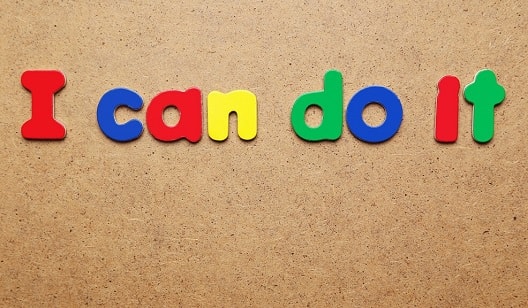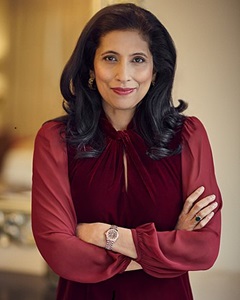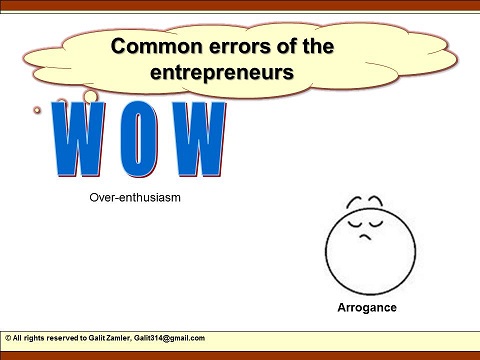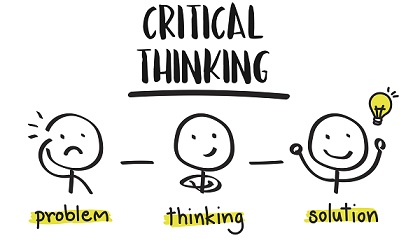


Entrepreneurs with high self-esteem are more daring, take on greater responsibility, and achieve more success. Therefore, nurturing high self-esteem throughout childhood will enable growth and achievements.
It will be easier for us to nurture self-esteem if we accept Rabbi Nahman from Breslov's prospection, he said, "know that each and every shepherd has a special melody. Know that each kind of grass has its special song."

The entrepreneur:
Already in the early stages, the entrepreneur understood that he/she must learn a lot to promote their project.
Part of the learning process is asking questions. An entrepreneur who is afraid to raise questions will learn things the hard way.
Every one of us has a field of expertise in which we tend to excel more than others.
It might be possible that in some fields, we are entirely ignorant. However, that does not reflect our ability to succeed in life. If we believe it is right to ask questions, we should do so without fear.
In practice, sometimes, we tend not to ask questions so as not to harm our image by revealing a lack of knowledge. If this is why we refrain from asking questions, then it indicates our lack of self-confidence.
A person who feels comfortable raising questions is one with high self-esteem, who has no problem revealing when they do not know or understand a particular subject.
Example:
First of all, I apologize for mentioning this example due to a person's honor, but the subject comes across well in this example:
One of Israel's defense ministers toured the north of the country and received binoculars to observe the area.
Although he didn't see anything, he didn't ask why, because he felt that there was an expectation among his classmates that he knew how to use binoculars, and if he asked, he might hurt his public image. However, a person with self-confidence and high self-esteem would ask and would not fear that a question like that would harm their status
In this case, it turned out that the binoculars' lenses were covered.
The fear of asking questions may stem from experiences at school or during various social gatherings where someone asked a question, and in response, others giggled or mocked. Such reactions suppress the desire to ask questions and get answers.
The solution to this lies in education for tolerance.
Galit Zamler has noticed that in many cases, people would like someone else to ask questions, so they do not have to ask themselves. She also learned that those who laugh at you often don't know the correct answer themselves, either because they are not experts on the subject or because they don't understand the question. Their behavior reveals a lack of understanding, self-confidence, and arrogance.
Asking questions is essential, even when everything seems clear, because we can find that one person means X and the other means Y. Both sides are sure they understood each other, but only by asking questions and getting answers can we confirm our understanding.
Throughout history, numerous mistakes have occurred due to misunderstandings between parties.
When it comes to children:
As educators, we should encourage children to ask questions and provide them with satisfying answers. And if we think the query is an "unnecessary" one, we can ask the child what they thinks the answer might be, and, from their response, we can understand why they raised the question.
The entrepreneur
Successful leaders, inventors, and entrepreneurs aren't afraid to speak their minds and walk their path, even if it's not acceptable to those around them.
As authority figures, we should encourage children to express their opinions, even if they differ from those of others. That's the way to encourage kids to think independently.
Most likely, none of us would want their child to behave in the same way as students who participated in Solomon Asch's study, which researched social peer pressure:
Source: Wikipedia Asch conformity experiments

The experiment found that, although it was clear that the left line is equal in length to line C, under the influence of peer pressure from collaborators with the experimenter, some students agreed with the incorrect answer given by the collaborator group.
Examples of people who choose positive, independent thinking, despite their critical surroundings:
People with positive, independent thinking are capable of taking their idea to a performance stage, even if their surroundings don't believe it's possible, such as in the following examples:
* Benjamin Ze'ev Herzl, the visionary of the Jewish state - "Everybody says I'm crazy, because that's what I see, and I see one solution: Jewish exodus from Europe and the establishment of a Jewish state in their historic homeland."
* Eliezer Ben-Yehuda, the initiator of the revival of the Hebrew language, initially considered by those around him to be crazy: Firstborn child, Itamar Ben-Avi, did not utter a word until the age of three. But fears lest his father's madness would cause the child mental retardation were proved wrong. (From the book: Pillar of Fire by Yigal Lucien, Keter Books)
* The Wright Brothers developed and flew the first plane, but for their first flight, the press didn't come to cover the event, because the two brothers were thought of as somewhat insane. Only four adults and one child, in addition to the Wright Brothers, attended the historic moment.
* Mario Levi, the founder of organic agriculture in Israel, said in an interview with the Haaretz newspaper: "It was not easy at first. When I first said, 'organic food,' people thought I was crazy."
* Dr. David Harari, a pioneer programmer of UAVs (uncrewed aerial vehicles) of Israel, said in an interview with Globes newspaper: "When I started working on the UAV program indoors and in the aerospace industry, people laughed at my crew and me. That was toward the end of the '70s, and most people did not believe in me, including members of the board. At that time, drones were not available anywhere, and we had to create one from scratch. We were stubborn, despite being laughed at and told we were just children playing with toys. Since then, the UAV project has achieved significant success in the world."
UAV Heron IAI

* Oren Shoval, one of the founders of Via's that develops an innovative system for public transportation once said: "There were people from the field who were very skeptical about the ability to build a very efficient technology that will know how to handle the city complexity such as, passengers who'll not make it on time or drivers who'll get lost. But as concerns grew, we got more determined about it, because we understood that people are afraid to get into this field with a technology solution."
* With the sale of MeyEden Company, Dan Naphtali wrote about its founder: "In those days, people thought he was crazy. No one believed that Israelis would pay for bottled water. And years later, there are other competitors, and paying for good water has become a culture, just as in Europe."
* Although we're familiar with the USB Flash (flash memory device), and it seems like this technology has existed forever, in reality, this Israeli-developed technology wasn't around before. It was invented by M-Systems about 20 years ago.
In his book "100 Doors: An Introduction to Entrepreneurship", Dov Moran describes the cold welcome his invention received by the market at the beginning: "M-Systems brought the USB Flash to the market and revealed it at the Comdex conference in Las Vegas in November of 2000... And what was the market's feedback? Nothing. That same December, I gave a lecture at an analysts' conference, where I presented the USB Flash for the first time in Israel. The response was... At best, I'm ignoring. At worst, disrespect. There were comments like: "Pocket-size memory stick? Who needs that?"
Exercise with children:
Brainstorming activities are a great way to allow each team member to practice self-reflective thinking and express opinions, ideas, and solutions without fear of criticism.
The entrepreneur is required to have high self-confidence to believe in themselves and their ability to realize their dreams.
It is not that the entrepreneur is born with self-confidence, but rather that they develop it over time, through many experiences that build their resilience and lead them to the conclusion that they can succeed, even when they encounter difficulties.
Example

In an interview, Leena Nair shared that when she was young and worked at Unilever, she lacked the self-confidence to express herself despite having something to say.
To overcome this, she took a small notebook and drew a star in it every time she dared to speak up.
Gradually, she accumulated stars for herself and overcame her lack of confidence.
Later, Lina became Chanel's CEO.
Dr. Ivan Joseph explains in his lecture that self-confidence is a skill that can be learned and developed.
He says that to build self-confidence, one needs great practice, determination, and perseverance. We must avoid negative thoughts that stop us from trying. We must think positively, understand that we are the masters of our destiny, and believe in ourselves.
Dr. Ivan suggests that educators who want to help their students focus on positive feedback for successes and positive behavior should refrain from using negative feedback.
One of the characteristics that distinguishes people with self-confidence is their ability to interpret reality in their way, rather than in the way others expect them to.
Entrepreneurs do the same. This way, they manage to deal with adverse reactions in a way that promotes them. Even when they hear the word "No" many times, they do not withdraw from continuing their journey.

The entrepreneur
Entrepreneurs, especially those in the service sector, receive recognition and appreciation from their colleagues and customers when they share the knowledge they have accumulated. Sharing knowledge demonstrates confidence, faith in yourself, and high self-esteem, without fear of losing your authority.
Galit Zamler: "A culture of keeping the knowledge to oneself, in my opinion, attests to the person's weakness and reveals one's concern about their status. This occurs in workplaces where there is no employment security or the employee's position is at risk. When a person feels confident and has high self-esteem, they will willingly share their surroundings with the knowledge they have gained."
People who share their environment with their knowledge benefit:
* They are considered experts in their field.
* They show openness to those around them as well as the ability to build social and business relationships.
* They get appreciation from their environment.
* And most of all, they get to learn a lot from their environment, because they are perceived as experts, and people consult with them and share their opinions, experiences, and problems. In this way, the person who is sharing becomes an authority.
Besides, sharing encourages camaraderie and empathy, and, therefore, helps to harness partners for a commitment to success.
An example from the business field:
Social networks have become a conventional means of communication. This occurred primarily due to the development of Facebook. One of the most fundamental rules of marketing through social networks is to showcase your expertise or business by uploading professional content to the web, which will add value to your target audience.
By sharing knowledge (alongside other marketing actions), the number of clients will grow.
People who share knowledge demonstrate, through the very act of sharing, that they have high confidence and self-esteem, and that they are not afraid for their status. They convey the message that they have many more insights to provide and that they are an authority in their field.
And that's the reason why we can find many articles on the internet today.
When it comes to kids:
Sharing knowledge at a young age is reflected in collaboration.
Group tasks, especially those that are challenging yet still age-appropriate for the children, encourage collaboration among group members, harnessing the knowledge and abilities of each child to benefit the group's success in the task.
The entrepreneur
One of the common reasons entrepreneurs fail is overconfidence; entrepreneurs who believe they understand their field the best often refuse to listen to their environment and clients.
The third module of the Entrepreneurship for Kids (EFK) Program focuses on learning from others' failures, addressing the issue of excessive confidence.

Yossi Yassur, in his book "Did You also have No Hot Water?" refers to this issue:
"Overconfidence also relates to optimism. Most people see themselves through rose-colored glasses. They believe their future is rosier than that of others, that they're better than others.
The combination of optimism and overconfidence causes people to exaggerate about their knowledge and their ability to control a situation, and also to underestimate the risks of their actions."
This phenomenon that Yossi Yasur describes is quite apparent when it comes to entrepreneurs who are technical people. Sometimes, for them, the product that they develop is the best there is, and precisely what the market needs. Therefore, the product will sell itself almost without any marketing efforts.
But the reality is usually different, and it turns out that there are already competing products. Clients have demands for changes, so if they don't take the right marketing actions, the product won't sell itself.

The entrepreneur
Cases in which the entrepreneur knows and can develop a project that achieves market success solely on their own are rare. The entrepreneur usually needs help.
The ability to ask for help stems from high self-esteem: a person who asks for help acknowledges their strengths and limits and does not fear letting others know they need help.
The need for help can arise in any field, and it only comes by admitting that we need it.
Ed Mlavsky, who is well-versed in the field of entrepreneurship in all aspects, discussed it in a video produced during Global Entrepreneurship Week. He said, "Don't be ashamed to ask for help."

For an entrepreneur to succeed, they must have a critical mindset, one that doesn't accept things for granted and is willing to correct them.
To develop critical thinking, we first have to believe in ourselves, in our judgment, and have self-confidence.
Critical thinking plays a crucial role in asking questions and seeking solutions. If there is no suitable solution, then the next project can be formed.
One of the common problems today, which spreads because people don't think critically enough, is "Fake News."
However, the "Fake News" problem can be easily turned into an advantage by training ourselves to think like entrepreneurs. This is an ability that can be developed with little attention.
When we encounter a 'news item,' we will exercise our judgment, ask questions, challenge it, and not accept the information as absolute truth.
When everybody acts like that, on one side, the "Fake News" problem will diminish because people will not behave like a herd, and fewer will share false items. On the other hand, our society will develop critical thinking skills, which are essential for fostering an entrepreneurial culture.
People, especially children, tend to accept answers obtained from internet searches as the absolute truth.
This video, created by the advertising agency DDB NZ in New Zealand, illustrates the importance of critical thinking, even when searching for information online.
With the entry of artificial intelligence into our lives, we must recognize that, despite the convenience, we must pay closer attention to verifying information and asking questions.